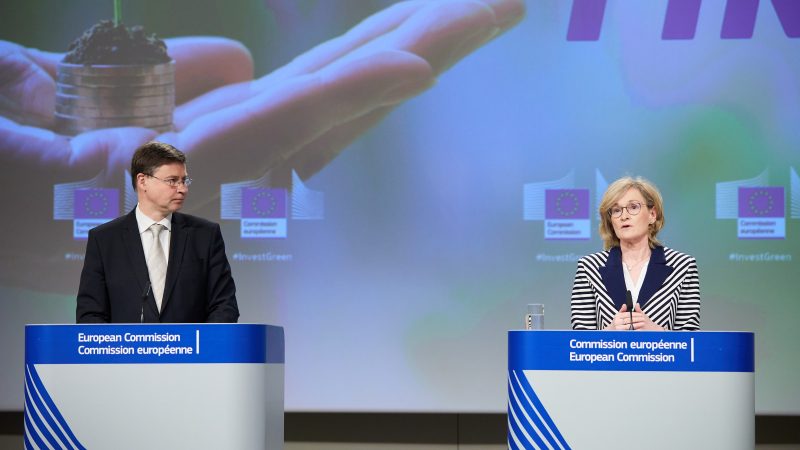
22/06/2022
EU Insight, 10 June 2022
Brussels, 10 June 2022
PARLIAMENT BLOCKS KEY ELEMENTS OF EU SUSTAINABILITY PLAN
The European Parliament failed to reach agreement on key components of the Fit-for-55 package, the EU’s strategy to reduce greenhouse gas emissions by at least 55 % by 2030, such as the reform of the EU’s carbon market and the proposed introduction of a carbon border tax. Members blocked the revision of the Emission Trading System, which aims to accelerate decarbonization of industry. Nonetheless, not all proposals were halted, as an initiative to ban the sale of new petrol and diesel cars by 2035 managed to reach common agreement. Parliament also agreed on a proposal to reduce greenhouse gas emissions and improve natural carbon sinks in land use and forestry.
EU REACHED A DEAL ON MINIMUM WAGE FOR ALL EMPLOYEES
The EU Member States and the European Parliament reached an agreement on the law on adequate minimum wages in the EU. Although the new EU-wide law does not mean that all European countries will have the same salary levels, it does mean that EU countries will have to guarantee decent working and living conditions for all employees. Furthermore, the new legislation aims to fight poverty and strengthen the idea of the social market economy. In practice, EU countries will take into account a basket of household goods and services and gross median wage to determine their minimum wage.
DEVICES TO HAVE USB-C CHARGING PORT STARTING FROM 2024
EU Member States and the European Parliament agreed on new rules regarding a common charger for mobile devices. All new devices on the EU market, regardless of their manufacturer, will have to be equipped with a USB-C charging port. New rules will have an impact on mobile phones, tablets, e-readers, earbuds, digital cameras, headphones and headsets, handheld videogame consoles, and portable speakers. Standardisation of a charging port across the EU aims to reduce electronic waste and allows to use one charger for all devices. Critics have argued that this legislation risk hindering innovation.
COUNCIL ADOPTS POSITION ON THE CONSUMER CREDIT DIRECTIVE
The Council agreed on a general approach on the revision of the Consumer Credit Directive (CCD). Increased digitalisation of the European economy has led to the emergence of new products and actors offering faster and simplified credit procedures, such as buy now pay later schemes, and has affected consumer preferences as regards online shopping. The new CCD provides a reinforced framework for consumer protection at European level for credit subscriptions, promotes transparent practices and is adapted to digital devices. Once the European Parliament adopts its positions, negotiations between co-legislators will start.
PARLIAMENT CALLS FOR TREATY CHANGE
The Parliament adopted two resolutions related to the functioning of the European Union. Firstly, Parliament asks the European Council to agree to starting the process to revise the Treaties. The changes proposed, among others, would include i) reforming voting procedures by switching from unanimity to qualified majority voting for certain issues, ii) strengthening the procedure to protect the EU’s founding values, and iv) previously mentioned right to initiate, amend, or revoke legislation for the Parliament. In the second resolutions, Parliament calls for the right to table legislative proposals, which they argue would strengthen EU democracy and restore institutional balance
COMING UP NEXT WEEK
- 12-15 June: Foreign Affairs Council (Trade). On the agenda: reform of the WTO, response to the unprecedented disruption to the world economy and global trade.
- 13 June: Agriculture and Fisheries Council. On the agenda: Fishing opportunities for 2023, Agricultural imports, Agricultural markets.
- 14 June: Employment, Social Policy, Health and Consumer Affairs Council (Health). On the agenda: European health data space (EHDS), EU’s global health strategy.
- 16 June: Eurogroup. On the agenda:
- 16 June: Employment, Social Policy, Health and Consumer Affairs Council (Social). On the agenda: European Semester, Platform Work, Social imbalances procedure.
- 17 June: College of Commissioners meeting. On the agenda: Communication on the follow-up to the Conference on the Future of Europe.
- 17 June: Economic and Financial Affairs Council. On the agenda: Croatia and the euro implementation, European Semester 2022, Recovery and Resilience Facility (RRF).
- 19 June: EU-Egypt Association Council. On the agenda : bilateral relations and political matters, EU-Egypt Partnership priorities until 2027
Karl Isaksson, Managing Partner Brussels, Kreab
____________________________________________________________________
Kreab • Tel: +32 2 737 6900 • karl.isaksson@kreab.com • www.kreab.com/brussels • Twitter: @KreabEU.
